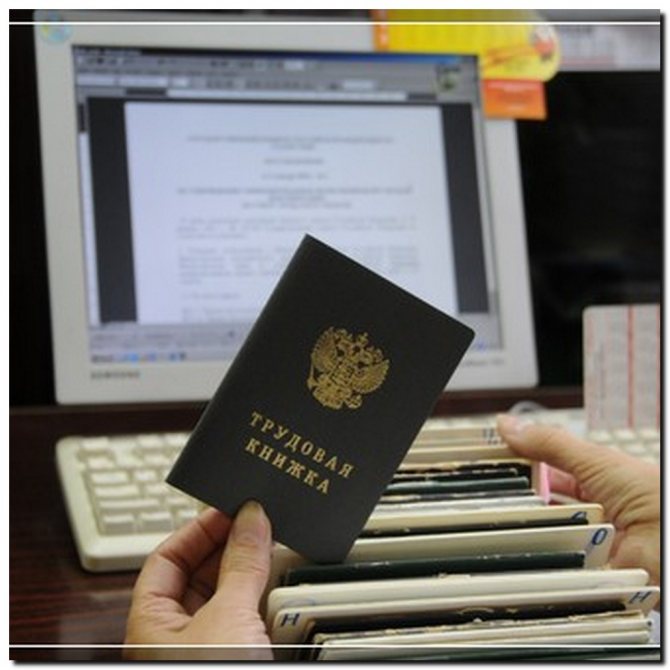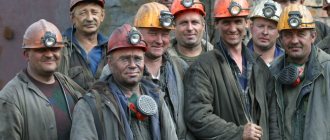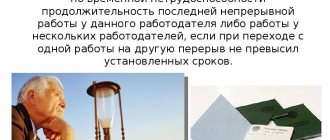Employees who work in hazardous or harmful working conditions have the right to retire early. The length of service for them is calculated in a special order. Among the people, the name “hot experience” was assigned to him.
What is hot work experience?
In the current Russian labor legislation there is no concept of “hot seniority”. However, this term usually refers to the time during which certain categories of workers worked, for whom the legislator established a preferential pension. These include two large groups of workers:
- persons who worked in production with harmful or dangerous working conditions (in fact, hence the expression “hot work experience” - after all, early retirement is also due to those who work in hot shops);
- citizens who worked on a rotational basis in regions belonging to the Far North.
The rules for early retirement in these situations are established by the Federal Law “On Labor Pensions”.
What does it include?
The first category of workers for whom longevity is calculated are persons who work in hazardous or hazardous industries. This is what these concepts mean.
- Harmful production is production in which working conditions adversely affect the worker’s body. This can cause various diseases directly during work or even after its termination (for example, dismissal or retirement).
- Hazardous production - this category includes production in which injury or death can occur to an employee (for example, steel production, metal working).
For working conditions at an enterprise to be considered harmful and dangerous, the following factors must exist:
- uncomfortable ambient temperature (high or low);
- the presence of harmful fumes, suspensions, dust, aerosols, gases in the air;
- carrying out work with substances with increased chemical activity (acids, organic solvents and the like);
- carrying out work with microorganisms, protozoa, living cells.
The second category of workers who have such length of service are shift workers working in the Far North. Under the watch, Article 297 of the Labor Code understands a type of organization of labor activity of citizens, due to the specifics of which they cannot return to their place of permanent residence every day. In simple terms, this is work away from home. The list of areas that are considered the Far North is established by Resolution of the Council of Ministers of the USSR of January 3, 1983 No. 12, which is still in force. In accordance with this document, the regions of the Far North include:
- Murmansk region;
- Tyumen region;
- Khanty-Mansiysk Autonomous Okrug;
- Komi Republic;
- Arkhangelsk region;
- Krasnoyarsk region;
- Irkutsk region;
- Republic of Yakutia;
- Magadan region;
- Republic of Karelia;
- Khabarovsk region;
- Kamchatka;
- Republic of Tyva;
- Sakhalin region.
For citizens who worked on a rotational basis in the listed regions, their length of service is calculated in a special manner.
What does long service mean for retirement?
The length of service discussed in this article allows you to retire early. However, before this, it is necessary to work in appropriate conditions that give the right to benefits for a certain time. It is different for representatives of different genders.
For men
The minimum retirement age for men is twelve and a half years. Once this time is reached, the man will be able to retire five years earlier than the age prescribed for all other citizens, that is, 60 years.
For women
For women, the minimum hot work experience is ten years. The retirement period, like for men, is reduced by five years. Thus, a woman can end her working career at 55 years old.
Despite the presence of an established minimum threshold of preferential length of service, even if the worker has not reached it, he has the right to early retirement. In this case, length of service is calculated based on the rule that every two and a half years worked in appropriate conditions brings retirement closer by one year for men and by two for women. For example, if a man worked for only two and a half years in conditions where seniority is hot, he will retire at 64 years old, that is, a year earlier.
How to confirm?
In order to retire early, it is necessary to confirm with the Pension Fund the fact of working in unfavorable conditions. To do this, you will have to provide the following documents:
- application for early assignment of pension;
- passport;
- a copy of the work book;
- a copy of the employment contract;
- SNILS;
- certificate of average salary for the last five years of work;
- for women - marriage certificate;
- a document confirming the recognition of working conditions at the enterprise where the citizen worked as harmful or dangerous;
- for shift workers - a document confirming work on a rotational basis.
In this video you can listen to advice from a lawyer regarding early retirement:
For certain categories of citizens, early retirement is provided. Among them are those who have so-called “hot work experience,” that is, people who worked in harmful or dangerous conditions, as well as those who worked on a rotational basis in the Far North. However, such experience must still be confirmed by submitting the established documents to the Pension Fund.
Dear readers ! If you need specialist advice on pensions and state benefits, we recommend that you immediately contact qualified practicing lawyers on social issues:
Moscow and region: +7
St. Petersburg and region: +7 (812) 426-11-82
Overview of professional areas for which the concept of “hot” experience applies
This concept is sometimes used as a replacement for the term “harmful” experience. We are talking about the period of work of a citizen in a certain area where conditions can negatively affect health.
Typically, this includes work at various mining enterprises or in the northern regions, but let’s talk about this in more detail and find out which professions are guaranteed to be subject to labor standards.
Persons performing labor duties in positions and in a specific area included in the list will be able to apply for state benefits before the required time:
- in the northern regions of the Russian Federation;
- at work underground;
- in hot shops;
- if the employment conditions are very difficult;
- for women when working as a tractor driver and in other industries;
- for female employees - textile production;
- metro and railway employees;
- public transport drivers;
- theater actors;
- medical institutions;
- correctional colonies;
- in flight crews;
- during unloading at the port;
- in logging and timber rafting;
- in geological exploration and forest management;
- rescuers and firefighters;
- schools and preschool institutions.
In addition to applying the concept of “hot” experience to the field of activity, in order to obtain state benefits ahead of schedule, you need to take into account two lists approved by the government. Registers are used to identify hazardous professions and areas of employment. Additional information on the topic of the article can be obtained from the video:
How lists are formed and what requirements apply to professions
All jobs and professions, taking into account the degree of health hazard, are divided into two lists. This was done on the basis of different conditions for assigning government payments. Detailed information on this topic is given in the table:
| List of professions | Conditions for granting state benefits |
| List No1. |
- all types of work performed underground;
- work in difficult and harmful conditions (refining oil resources, creating military shells);
- work in hot shops.
And other activities.
- Men leave at the age of 50 if they have 10 years of “hot” experience and 20 years of insurance;
- from the age of 45 - women, if they have experience: “hot” - from 7.5 years, and insurance - from 15 years.
When a person works under the conditions reflected in the 1st register, but the length of service is not enough, then the state benefit is assigned as for an employee of the 2nd list.
- mining;
- harmful and difficult working conditions (production of medicines);
- transport professions.
- Men are leaving at 55 years of age, with a “hot” experience of 12.5 years and insurance experience of 25 years;
- Women over 50 go on holiday if they have experience: “hot” – from 10 years, and insurance – from 20 years.
Early retirement is provided, but depends on the conditions of employment, the gender of the candidate and the duration of each type of service.
Each list is similarly presented in Resolution of the USSR Cabinet of Ministers No. 10 of January 26, 1991.
What is included in harmful experience?
Attention
The period of harmful work experience is from 20 years, the insurance period is from 20 years.
- Women over 50 years old. Reasons: activity as workers of locomotive crews and other workers in the system of organizing transportation and traffic safety in railway transport and the subway + as drivers of freight transport in mines, mines and quarries. The period of harmful work experience is from 10 years, the insurance period is from 20 years.
- Men over 55 years old.
Reasons: activity as workers of locomotive crews and other workers in the system of organizing transportation and traffic safety in railway transport and the subway + as drivers of freight transport in mines, mines and quarries. The period of harmful work experience is from 12.6 years, the insurance period is from 25 years.
- Women/men from 50-55 years old. Reasons: work in the Far North. The period of harmful experience is from 15 years.
- Men over 55 years old.
Papers certifying the presence of “hot” experience
A person who is part of a group of people entitled to early state benefits is required to present documents confirming the fact that he has the necessary work experience.
The following can be noted as mandatory documents:
- citizen's passport and SNILS;
- military ID (for men) and marriage certificate (for women); labor. book with detailed employment records;
- additional information about experience, available for confirmation, using archival certificates and other extracts;
- birth certificate of children and TIN;
- other certificates and extracts confirming the harmfulness of the position held, for example, a statement of disability.
Experts in this matter recommend contacting the Pension Fund of Russia office a few months before retirement and clarifying all questions. If necessary, fund employees will be able to send special requests to the citizen’s place of employment and receive clarifying answers.
What is hot work experience and what does it include - an overview of professions with hot work experience
Harmful or “hot” experience is considered to be continuous experience in a “harmful” profession defined by law or “northern” experience.
Citizens who have worked before the deadline have the right to become pensioners...
- In the regions of the Far North.
- In certain underground operations.
- In hot shops (metallurgy, etc.).
- With harmful or difficult working conditions.
- Tractor drivers in agriculture (for women) and other economic sectors.
- In the textile industry, subject to increased severity and intensity (for female employees).
- As subway and railway transport workers.
- In geological exploration, forest management and other works.
- At timber rafting and logging.
- At port unloading works.
- In crews on various vessels.
- On flight crews.
- As rescuers when working in one of the emergency rescue, fire services or the Ministry of Emergency Situations.
- As employees in correctional institutions.
- In children's and school institutions.
- In health care institutions of the country.
- As drivers of public regular transport.
- On theater stages or in theatrical and entertainment organizations.
Preferential conditions for early retirement are defined by Article 27 of Federal Law No. 173 dated 12/17/01. All professions/positions that fall under the concept of “harmful” are listed in 2 corresponding lists.
List 1 (the most hazardous professions and jobs) includes:
- Any type of work underground (tunneling, work in mines/mines, etc.).
- Work in particularly difficult and harmful conditions (production of ammunition and electrical equipment, oil refining, etc.).
- Work in hot shops (glassmaking, metallurgy, ceramics production, etc.).
- Etc.
Men who worked in professions from List 1 retire at the age of 50, provided they have at least 10 years of “harmful” work experience and 20 years of insurance service. Women retire at 45 years old with an insurance period of 15 years and a “harmful” period of 7.5 years. If employed in particularly hazardous work (from List 1) less than half of the annual norm, a pension is assigned in accordance with List 2.
List 2 includes:
- Mining works.
- Harmful and difficult working conditions (food and light industry, production of medicines and hardware, oil and gas production, etc.).
- Transport professions.
- Etc.
Men who worked in professions from the 2nd List retire at 55 years old with an insurance period of 25 years and “harmful” service of 12.5 years. Women retire at the age of 50 with an insurance period of 20 years and a “harmful” period of 10 years.
The conditions for early retirement will depend on the insurance and special length of service, working conditions and gender. The age range for early retirement is 40-55 years.
You can study Lists 1 and 2 in detail in the official document: Resolution of the Cabinet of Ministers of the USSR dated January 26, 1991 No. 10 “On approval of lists of production, work, professions, positions and indicators giving the right to preferential pension provision” (as amended on July 23 , August 9, October 2, 1991).
Probability of maintaining benefits for electric and gas welders after 2020
In accordance with Federal Law No. 400 and the new reform in this area, for activities involving hazardous work conditions, including those harmful to health, the provisions on preferential pensions for welders remained unchanged.
Article No. 30 (Part No. 1, Clause No. 2) of this legislative act also states that in addition to the profession of “electric and gas welder,” persons operating in quarries, boiler houses, battery workers, etc. are also entitled to such concessions.
Employees who work in hazardous or harmful working conditions have the right to retire early. The length of service for them is calculated in a special order. Among the people, the name “hot experience” was assigned to him.
What is hot work experience?
In the current Russian labor legislation there is no concept of “hot seniority”. However, this term usually refers to the time during which certain categories of workers worked, for whom the legislator established a preferential pension. These include two large groups of workers:
- persons who worked in production with harmful or dangerous working conditions (in fact, hence the expression “hot work experience” - after all, early retirement is also due to those who work in hot shops);
- citizens who worked on a rotational basis in regions belonging to the Far North.
The rules for early retirement in these situations are established by the Federal Law “On Labor Pensions”.
What does it include?
The first category of workers for whom longevity is calculated are persons who work in hazardous or hazardous industries. This is what these concepts mean.
- Harmful production is production in which working conditions adversely affect the worker’s body. This can cause various diseases directly during work or even after its termination (for example, dismissal or retirement).
- Hazardous production - this category includes production in which injury or death can occur to an employee (for example, steel production, metal working).
For working conditions at an enterprise to be considered harmful and dangerous, the following factors must exist:
- uncomfortable ambient temperature (high or low);
- the presence of harmful fumes, suspensions, dust, aerosols, gases in the air;
- carrying out work with substances with increased chemical activity (acids, organic solvents and the like);
- carrying out work with microorganisms, protozoa, living cells.
The second category of workers who have such length of service are shift workers working in the Far North. Under the watch, Article 297 of the Labor Code understands a type of organization of labor activity of citizens, due to the specifics of which they cannot return to their place of permanent residence every day. In simple terms, this is work away from home. The list of areas that are considered the Far North is established by Resolution of the Council of Ministers of the USSR of January 3, 1983 No. 12, which is still in force. In accordance with this document, the regions of the Far North include:
- Murmansk region;
- Tyumen region;
- Khanty-Mansiysk Autonomous Okrug;
- Komi Republic;
- Arkhangelsk region;
- Krasnoyarsk region;
- Irkutsk region;
- Republic of Yakutia;
- Magadan region;
- Republic of Karelia;
- Khabarovsk region;
- Kamchatka;
- Republic of Tyva;
- Sakhalin region.
For citizens who worked on a rotational basis in the listed regions, their length of service is calculated in a special manner.
What does long service mean for retirement?
The length of service discussed in this article allows you to retire early. However, before this, it is necessary to work in appropriate conditions that give the right to benefits for a certain time. It is different for representatives of different genders.
For men
The minimum retirement age for men is twelve and a half years. Once this time is reached, the man will be able to retire five years earlier than the age prescribed for all other citizens, that is, 60 years.
Pension based on active service - what documents confirm active service upon retirement?
Every citizen who falls into the professional/social category established by the law of the Russian Federation receives the right to early retirement. A prerequisite for obtaining such a right is compliance with the general requirements for seniority.
The package of documents to confirm your seniority includes:
- Employment record book with all necessary information – original + photocopy (employment contract).

- Additional information (which was not indicated in the work book) determining the right to early retirement: certificates clarifying the special working conditions and their nature in a particular institution or organization/enterprise - for the entire period of work from all places of work.
- Russian passport + photocopy.
- SNILS + photocopy.
- For women: marriage certificate + copy.
- For men: military ID + copy.
- Certificate of birth of children + copies.
- A document on the average salary for any 5 years of activity.
- TIN.
- Other documents/certificates confirming the harmfulness of the work (certificates from medical institutions about disability, etc.).
If there are children aged 18-23 who are undergoing full-time education:
- Document on income for the last 3 months.
- Document on the amount of the scholarship.
- A document confirming that the child is a dependent.
- Study document.
Documentation to confirm a preferential pension
To obtain information regarding the required package of documents, you can contact the nearest territorial Pension Fund. To obtain the right to early retirement, you must contact the above-mentioned institution at least 5 months before your expected retirement. Such a line is needed so that the citizen has time to collect the necessary documents, and PF specialists review the provided documentation and make a decision on refusal or permission to receive a preferential pension. You can also submit an application online on the PF website.
List of documents
A copy and original of the work book with the necessary records and the employment contract. Additionally, information is provided that confirms the right to early retirement (clarification of working conditions and characteristics), and documents confirming the presence of harmful conditions in the position performed. Copy and original of passport, taxpayer identification code and insurance certificate, as well as the child’s birth certificate. The list of documentation also includes a marriage certificate (for women) and a military ID (for men). Information about income for the previous 5 years of work. If an employee has adult children under 23 years of age who are receiving in-patient education, the list of documentation must include information about the child’s place of study, the amount of the scholarship, information about income for the previous 3 months, as well as information confirming that the children are supported by their parents .






